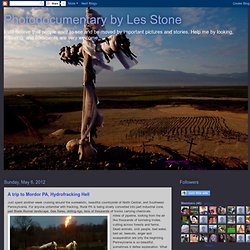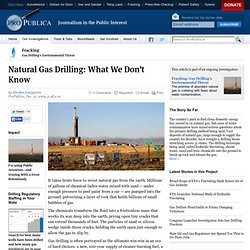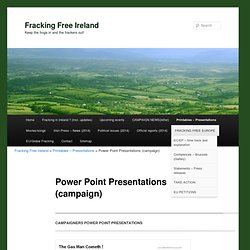

Photodocumentary by Les Stone: A trip to Mordor PA, Hydrofracking Hell. Just spent another week cruising around the surrealistic, beautiful countryside of North Central, and Southwest Pennsylvania.

For anyone unfamiliar with fracking, Rural PA is being slowly converted into part industrial zone, part Blade Runner landscape. Gas flares, drilling rigs, tens of thousands of trucks carrying chemicals, miles of pipeline, looking from the air like thousands of tunneling moles, cutting across forests and farms. Dead animals, sick people, bad water, bad air, lawsuits, anger and exasperation are only the beginning. Pennsylvania is so beautiful, sometimes it defies explanation.
***Sorry, I thought the pictures had captions, but not to be. Discussing Why allow Fracking?...A poisoned environment in News-Photojournalism-Australia. Tetley T says: How much power does oil money have in America?

It seemed to have managed to get both Bushes into power and influence. The linkage between, Cheney, Bush and Halliburton are well known. (see link below)en.wikipedia.org/wiki/Halliburton In 2005 Bush exempted fracking from regulations under the U.S. Clean Water Act.oilprice.com/Energy/Natural-Gas/Earthquakes-Water-Polluti... Fracking. Irish People dig Irish Gas. Directory of anti-fracking groups worldwide « Bridgend Green Party.
Not comprehensive – but still quite an impressive list.

The video from Australia gives a glimpse of what South Wales will look like when the frackers get in their stride.AUSTRALIA:Why Tara is Blockading QGC – The Tara Blockade of Coal Seam Gas Company QGC The Residents of the Tara Estate near Chinchilla, Queensland have decided enough is enough and are blockading QGC from entering their estate. They have Locked Their Gates. Frack Free Aotearoa (blog) Fracking (Page) Pour un moratoire sur Le gaz de.
Natural Gas Drilling Debate Heats Up: Read Our Guide. The possible dangers of gas drilling, including the process known as hydraulic fracturing, are drawing more attention from the media as gas drilling expands across the United States.

Here’s a quick breakdown of the key issues, drawn from ProPublica’s reporting. Photo by Abrahm Lustgarten/ProPublica It’s been a busy couple of weeks in the fracking and natural gas drilling debate, with the documentary film Gasland [1] nominated for an Academy Award and a front-page story [2] in Sunday’s New York Times on the dangers posed by the technology. Human Health. Diagrams. Monongahela National Forest fracking study. Infamous Oil history. Natural Gas Drilling: What We Don’t Know. The chemicals transform the fluid into a frictionless mass that works its way deep into the earth, prying open tiny cracks that can extend thousands of feet.

The particles of sand or silicon wedge inside those cracks, holding the earth open just enough to allow the gas to slip by. Gas drilling is often portrayed as the ultimate win-win in an era of hard choices: a new, 100-year supply of cleaner-burning fuel, a risk-free solution to the nation’s dependence on foreign energy. In the next 10 years, the United States will use the fracturing technology to drill hundreds of thousands of new wells astride cities, rivers and watersheds.
Cash-strapped state governments are pining for the revenue and the much-needed jobs that drilling is expected to bring to poor, rural areas. More than a year of investigation by ProPublica [1], however, shows that the issues are far less settled than the industry contends, and that hidden environmental costs could cut deeply into the anticipated benefits. Power Point Presentations. The Gas Cometh - The attached is a presentation I have given on the economics as put forward by Tamboran.

It should be noted that both the GSNI (Geological Survey of Northern Ireland) and PAD Geologist in submissions to Assembly and Dail committees have stated that Tamboran’s figures can’t really be trusted. Shale_Economics_With_References Both Dr Janette Barth and Susan Christopherson links at the end of the document point to youtube presentations on the local economic effects of Shale Gas extraction and they also question many of the industry studies, given there are no peer reviews.
Similarly one needs to be careful about ‘frackademia’ where research is funded or carried out by universities or people with vested interests who haven’t declared those interest. a google for University of Texas or State University of Buffalo with shale shows some of the problems in this area. Art Berman’s presentation to ASPO 2012 is available here : ———————————————————————————————————————————- Part 1.